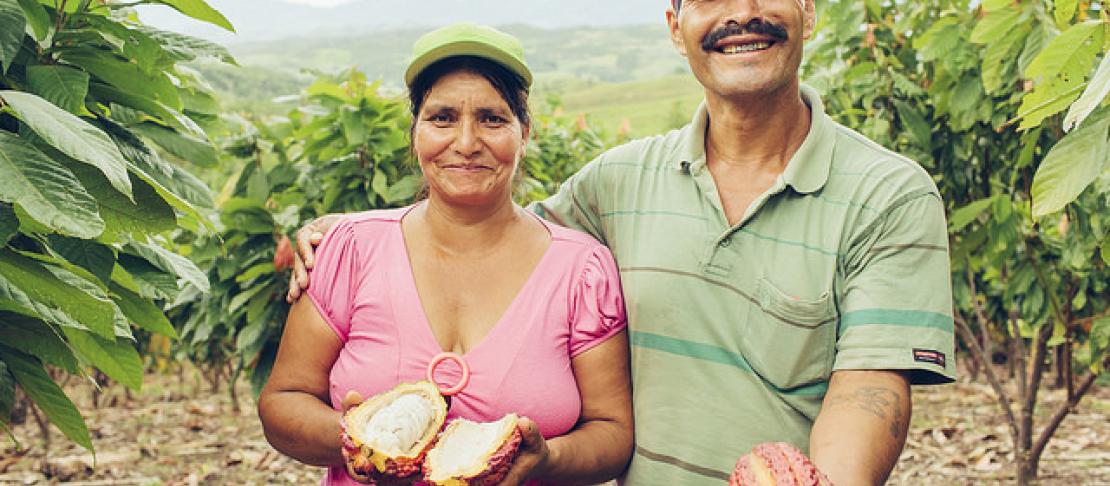Successful launch of climate smart value chain project for coffee and cocoa in Peru

CCAFS brought together representative cross-section of the coffee and cocoa sector to discuss the current status of climate resilience in the sectors, and identify collective activities through which this project can support key actors to identify and promote more resilient approaches for smallholder coffee and cocoa in Peru.
Climate change and climate variability are expected to have a significant impact on smallholder farming in the Peruvian coffee and cocoa sectors. As a response, new measures that can address those impacts are being defined under what we call ‘Climate Smart Agriculture’ (CSA). This new buzz term already includes many of the tried and true measures that form the backbone of sustainable agriculture – building soil fertility, protecting watersheds, increasing access to knowledge, inputs and markets for more profitable and food secure farming livelihoods.
In addition, and apart from aiming to reduce GHG emissions from farming, the concept of CSA also introduces a new angle in that it helps farmers, government, companies and NGOs better understand and manage the risks posed by climate change and thus be more resilient. In order to make such efforts meaningful for a large number of stakeholders, scaling climate smart agriculture necessitates engaging multiple actors to understand site-specific projections of climate impacts and develop suitable responses accordingly.
To begin to answer these questions for the coffee and cocoa value chains in Peru, the International Center for Tropical Agriculture (CIAT), Root Capital, Rainforest Alliance and the Sustainable Food Lab convened the first workshop of the Certified supply chains and impact investment project, of the CGIAR Research Program on Climate Change, Agriculture and Food Security (CCAFS) in Lima, Peru on the 18th of November.
The goal of this workshop was to convene a representative cross-section of the coffee and cocoa sector to discuss the current status of climate resilience in the sectors, share the overall project approach and goals and identify collective activities through which this project can support key actors to identify and promote more resilient approaches for smallholder coffee and cocoa in Peru.
In total, more than 90 people representing producer organizations, NGOs, the private sector, research centers and different parts of the Peruvian government participated in spirited discussions about how to improve the sustainability of these key value chains.
The workshop started with reflections from the Cámara Peruana del Café y Cacao and the Junta Nacional de Café about the current state of coffee and cocoa production in Peru which highlighted the need to increase productivity, profitability and public-private coordination in these sectors. All of these factors will become even more complex under climate change.
Following this framing exercise, an overview presentation on the project was shared and initial questions answered. Closing out the morning session, a panel discussion explored existing climate change programs active in Peru and opened the debate about what is underway and what still needs to done. The afternoon of the workshop was spent in participatory exercises and discussions to identify and map a full list of existing private and public initiatives, map the social networks in the coffee and cocoa sector and list key opportunities and problems that need to be addressed.
Key outcomes from the workshop include:
The interest of stakeholders along the coffee and cocoa supply chains in Peru in the topic of climate change is very high. No assessment of the impacts of climate change on these two important crops has been conducted for the country. Therefore actors are highly uncertain about where, when and what to expect from climate change.
Several projects work on the topic of climate change to adapt the sectors and increased coordination would be helpful.
Very high demand for actionable recommendations to confront specific climatic changes in specific regions of the country.
We as the Climate Smart Value Chains team see us in a good position to fill some of these gaps. Over the coming weeks we will engage with our new partners to gather the data necessary to develop Peru-specific climate impact gradients. These will guide the adaptation strategies of the local projects. We thus hope to add valuable scientific intelligence to existing initiatives in order to climate-proof the cocoa and coffee value chains in Peru.
Mark Lundy is the leader of the Certified supply chains and impact investment project.
This text was originally published in the DAPA Blog. Read the original.



